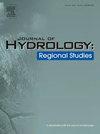Quantitative characterization, spatiotemporal evolution, and analysis of driving factors of daily dry-wet abrupt alternation: A case study of the Ganjiang River Basin
IF 4.7
2区 地球科学
Q1 WATER RESOURCES
引用次数: 0
Abstract
Study Region
This study focuses on the Ganjiang River Basin, a major tributary of the Poyang Lake located in southern China.
Study Focus
With the growing frequency of extreme weather events driven by climate change, there is increased attention on compound disasters such as Dry-Wet Abrupt Alternation (DWAA). This study aims to quantify and define DWAA in the Ganjiang River Basin by developing and applying a DWAA Index (DWAAI) using a percentile threshold method. The objective is to investigate the spatiotemporal characteristics and patterns of DWAA in the region. Precipitation data from 12 meteorological stations were analyzed to track these events from 1970 to 2019.
New Hydrological Insights For the region
The results of this study provide new insights into DWAA dynamics in the Ganjiang River Basin. Key findings include: (i) The DWAAI effectively captures the extremes of Dry-Wet Abrupt Alternations, especially at the 1st and 99th percentiles; (ii) The basin experienced 37–48 dry-to-wet events (DtWs) during the study period, with higher frequencies observed in the central-eastern, western, and northern mountainous areas, and lower frequencies in the southern regions; (iii) Wet-to-dry events (WtDs) were less common than DtWs and exhibited a distinct spatial and temporal shift from the southern mountains toward the central basin; (iv) Temperature was identified as the dominant factor influencing DWAAI changes, while large-scale atmospheric patterns such as AO, ENSO, PDO, and Sunspot activity showed insignificant correlations. These findings offer critical insights for improving water resource management and climate adaptation efforts in the region.
日干湿骤变的定量特征、时空演变及驱动因素分析:赣江流域案例研究
研究区域本研究的重点是位于中国南部的鄱阳湖主要支流赣江流域。研究重点随着气候变化导致的极端天气事件日益频繁,干湿急剧交替(DWAA)等复合灾害日益受到关注。本研究旨在采用百分位阈值法,通过开发和应用干湿交替指数(DWAAI),量化和定义赣江流域的干湿交替。目的是研究该地区 DWAA 的时空特征和模式。本研究的结果为赣江流域的 DWAA 动态提供了新的见解。主要发现包括(i) DWAAI 有效捕捉了干湿急剧交替的极端值,尤其是第 1 和第 99 百分位数;(ii) 在研究期间,流域经历了 37-48 次干转湿事件(DtWs),在中东部、西部和北部山区观测到的频率较高,而在南部地区观测到的频率较低;(iv) 温度被认为是影响 DWAAI 变化的主导因素,而诸如 AO、厄尔尼诺/南方涛动、PDO 和太阳黑子活动等大尺度大气模式则显示出不明显的相关性。这些发现为改善该地区的水资源管理和气候适应工作提供了重要启示。
本文章由计算机程序翻译,如有差异,请以英文原文为准。
求助全文
约1分钟内获得全文
求助全文
来源期刊

Journal of Hydrology-Regional Studies
Earth and Planetary Sciences-Earth and Planetary Sciences (miscellaneous)
CiteScore
6.70
自引率
8.50%
发文量
284
审稿时长
60 days
期刊介绍:
Journal of Hydrology: Regional Studies publishes original research papers enhancing the science of hydrology and aiming at region-specific problems, past and future conditions, analysis, review and solutions. The journal particularly welcomes research papers that deliver new insights into region-specific hydrological processes and responses to changing conditions, as well as contributions that incorporate interdisciplinarity and translational science.
 求助内容:
求助内容: 应助结果提醒方式:
应助结果提醒方式:


